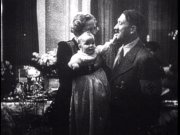The Banality of Evil...
Introduction
There's a human characteristic that comes into play when dealing with controversial characters from history whether it's Fred West, Harold Shipman or Ghengis Khan. We demonise them, almost without exception. It appears that as a species, and this isn't a modern phenomenon by any means, we cannot handle the simple fact that someone who performs evil acts or is the figurehead for evil can have any human traits at all. It's clearly not true, but the persistence in dehumanising these people still prevails despite the fact that they all ultimately performed the same bodily functions as the rest of us.
Top of this leaderboard of demonised historical figures is Adolf Hitler, a man who mesmerised an entire country (and not even his own at that), leading them into a war as well as attempting to wipe out the entire Jewish population of Europe. On the other hand, Hitler is not thought to have personally killed anyone during his time as Reichschancellor other than himself in his bunker in 1945, as opposed to Khan who was responsible for a vast amount of murders and Idi Amin who was rumoured to have eaten people that he'd either ordered killed or killed himself.
Make no mistake, this is no apologist justification for Hitler not being a monster but just a naughty boy (to paraphrase Monty Python) but an honest appraisal that in the end the nazi dictator was simply a man with an appetite for war and the extermination of the Jewish race. Seriously flawed and demented yes, but a man nonetheless. To pretend otherwise is to deny that anyone could occupy a similar position and that is just plain wrong.
In 1973 a group of filmmakers including David Puttnam felt the same way and compiled the documentary Swastika. Initially this group were looking to produce a film based on the book Inside The Third Reich by Albert Speer, the influential architect who became Hitler's right hand man and responsible for both the look and feel of Nazi Germany during this period. Sadly the filmmakers couldn't quite get their act together before the rights lapsed and instead looked towards a documentary. At around the same time as this thought gestated, word came to them that colour film used by Hitler's mistress and wife Eva Braun was sat in the US Archives after being repatriated from Hitler's Bavarian residence in Obersalzberg back in 1945, and with no one bothering to catalogue them in full, they lay amongst a batch of newsreel footage. This footage showed the Nazi dictator and his inner circle relaxing at Berchtesgaden, and some far more relaxed footage showing Braun and her friends swimming or playing around.
Director Phillipe Mora and Lutz Becker decided that they would compile this footage along with both propaganda footage and newsreel footage into a documentary showing Hitler in a different light than the demonic dictator in his bunker ordering the deaths of millions of people. They also decided that they wouldn't include any kind of narration so that people would have to make up their own minds as to how they viewed this footage of the most reviled man of the 20th Century. This didn't quite work out how they envisaged, despite a promising start with an invite to premiere the film at the Cannes Film Festival.
With no narration, the audience at Cannes seemingly couldn't handle what they were being shown and forced the film to be stopped just after halfway through the screening, proclaiming Swastika to be a pro-Nazi sympathetic film. This led to a banning in Germany for 36 years prior to being shown at the Biberach Film Festival earlier this year.
Picture/Sound
Although there is a large amount of colour footage on display here, it is mixed with both b&w propaganda material and newsreel footage. Quality is not always great but considering we're talking about at least 60 years ago, it's more than passable.
All footage taken was silent but a decision was taken at the time of compilation to add voice work to the documentary. This involved work with lipreaders to come up with dialogue and then voice over artists to bring these words to life. When Albert Speer was shown the film in preview, he confirmed that the dialogue was authentic and that the voice work was pretty accurate other than his own, which he complained made him sound like he had a cold…
Extras
A wide array of interesting extras that include the filmmakers discussing the making of the film and ensuing the controversy that started with the abandoned showing at the Cannes Film Festival.
Also included is an archive interview of Ludovic Kennedy with both Lutz Becker and a rehabilitated Albert Speer.
There is also a four page booklet which contains notes on the film as well as an excerpt from an interview with Lutz Becker in 1973 on how they managed to track down the Braun colour footage.
Overall
Why do we do it? Why do we demonise people deemed to be evil and refuse to allow them any human characteristics or traits? Personally I believe that most of us just can't handle the thought that "there but the grace of God go I" when considering these people. It's somewhat easier with the likes of dictators like Hitler as only extraordinary people tend to rise up to become the leaders of nations, despite his somewhat more humble beginnings. It's somewhat harder with the likes of a GP who killed a lot of his older patients or a builder who along with his wife took in stray girls and murdered them as they are nearer to us but it's done nonetheless.
It's important in all these cases not to elevate them to a status that is more than human, or inhuman, in these cases. They were all human beings but something within them drove them to act in this way and without understanding this, we condemn ourselves to hatred without understanding the motivations of their actions - which may well be some kind of comfort blanket actually. I prefer to more open in this by acknowledging that all these people were not that dissimilar to anyone around us including ourselves and only circumstance and our reaction to it make us different.
This is why the release of films such as Swastika are so important and are likely to have the same profound effect that Bruno Ganz's performance in Downfall had over thrity years later. It's vital that we can see that whilst Hitler was a dictator with extreme right wing tendencies and a passionate if irrational hatred for the Jews, the majority of his country actually subscribed to these beliefs as well. You only have to look at the footage of the Nazi rallies or of Hitler doing meet-and-greets to see the enormous crowds that turned out to meet and listen to him (and the latter I find bizarre after listening to some of his rather poor speeches, although I clearly listen with modern ears…). You cannot hide behind the fact that the German people of the time didn't know what was going on, at least in part. Kristalnacht was not an isolated incident and the anti-Semitic laws passed by the German government makes it obvious where things were surely heading.
It's clear that we'll probably never get the answers we really need as to why Hitler rose to power and then drove his country to ruin with the willingness of his adopted peoples, but it is also clear that they weren't for the most part dragged there forcibly. As a post-war society we've allowed ourselves to gloss over the facts of this period and to continue to do so makes the likelihood of a return to fascism more not less likely. This is why films such as Swastika are so important and why this re-release is so welcome.
Viewing Hitler and his entourage whilst relaxing conclusively demonstrates the banality of evil.
Recommended.



















































Your Opinions and Comments
Be the first to post a comment!